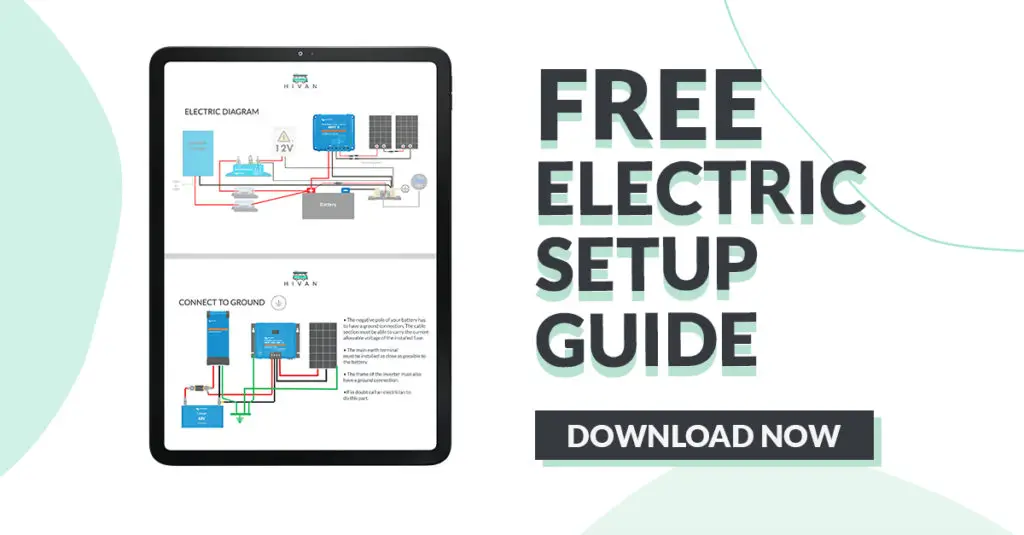Pop-up campers offer a unique and convenient way to enjoy the great outdoors, providing the perfect balance between tent camping and travel trailers.
While these lightweight campers are versatile and easy to tow, the question often arises—can a pop-up camper tip over? The short answer is yes, a pop-up camper can tip over, but certain factors and precautions can significantly reduce the risk.
A variety of situations can cause a pop-up camper to tip over, including improper weight distribution, setting up on uneven ground, high-speed winds, and improper towing. To keep your camper adventure safe, it’s crucial to understand how to correctly set up and haul your pop-up camper, as well as how to avoid or respond to potential tipping hazards.
Key Takeaways
- Pop-up campers can tip over in certain situations, but precautions can reduce the risk
- Proper weight distribution, set-up, and towing are crucial for pop-up camper stability
- Be prepared for weather conditions like high-speed winds and uneven terrain
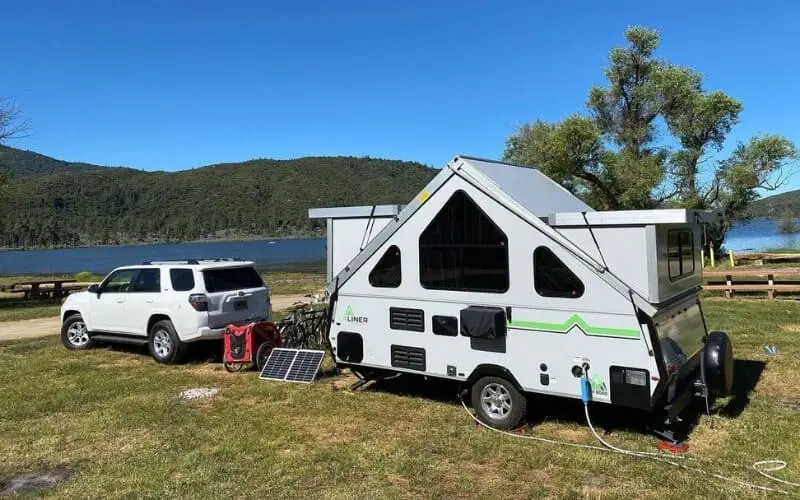
To learn more about keeping your camper upright, keep reading. We’ll cover all the potential reasons why your camper could tip over, how to prevent tipping incidents, and what you should do if your camper does happen to fall over.
Factors Influencing Pop-Up Camper Stability
Pop-up campers are a wonderfully low-cost alternative to more expensive RVs, giving you the freedom to travel wherever you’d like on a budget.
Many potential factors can cause a pop-up camper to tip over, whether it’s stationary or towed from behind your primary vehicle.
The leading causes include the following:
- Setting up the camper on uneven ground: Never unhitch your camper from your vehicle until you’ve found a spot on even ground. You may need to place wooden planks or concrete blocks underneath one or more of the camper’s wheels if you can’t find a level surface. Check your camper’s spirit levels before unhitching and settling on a spot. You can also use a bubble level to help you set it perfectly flat.
- Poor weight distribution: Proper weight distribution is crucial in preventing your pop-up camper from tipping over.
Ensure that heavy items are placed low in the camper, near the axle, to help maintain a low center of gravity. You should also properly secure all items inside the camper to avoid any shifting during travel. Adjusting the tongue weight on your tow vehicle can also help create a more stable towing experience. - High winds or inclement weather: High-speed winds combined with rain, snow, or hail can cause your pop-up camper to sway and eventually tip over. Try to keep an eye on your local weather forecast before setting out on your travels.
- Driving too fast: Keep in mind that speed limits for RVs and hauling trailers are usually lower than speed limits for standard vehicles. Pop-up campers are especially prone to tipping if you haul them at high speeds, as they are more lightweight than standard campers.
- Jackknifing/Fishtailing: Avoid making sharp turns while hauling your camper, as this can offset its center of gravity and cause it to fall over. Reckless driving while towing even a small trailer can be especially hazardous on highways and other populated roadways.
- Improper towing capacity: Always make sure your vehicle’s towing capacity is well over the weight of your camper. If your vehicle struggles while hauling your camper, it could become unstable and fall over.
- Manufacturers Specifications: Different pop-up camper models offer various levels of wind resistance and stability. Always refer to the manufacturer’s specifications, provided in RV handbooks for your specific trailer type, to understand these limitations. These can include details about jacks, stabilizer bars, and wind speed limits for safe usage. Following these guidelines will help ensure a safer and more enjoyable camping experience.
Next, we’ll cover how to haul and set up your camper so that it doesn’t tip over while keeping the above precautions in mind.
Preparing, Hauling, and Setting Up Your Camper Properly
You’ll need to practice setting up your camper a few times before you ever take it out on the road to your eventual travel destinations. Be sure to follow your camper’s user manual and only unhitch it from your vehicle once you’re sure it’s on even ground and the camper’s spirit level readings are within an acceptable range.
💡 Designed for RVs, campers, trailers, and other vehicles that tilt.
💡 It monitors tilt from -10 to 10 degrees and provides an easy-to-read display with engraved and hand-painted numbers.
The product is made in the USA from high-quality materials and is built to last.
When hauling your pop-up camper to a campsite or other area, make sure your vehicle’s hauling capacity can handle the camper’s weight.
Drive safely and avoid making sharp turns or accelerating too quickly, especially if the weather is particularly windy and rainy. Most campers tend to tip during hauling and not while stationary, so safe driving is essential.
Once you’ve reached your destination, check once more that your chosen spot is on level ground.
Get in the habit of doing this every time you move your camper to a new location, as another primary cause of pop-up campers tipping over is setting up on the uneven or hilly ground.
Before unhitching your camper, the first thing you’ll need to do is slowly lower the tongue jack to the ground. Be sure any electrical cables, ropes, chains, or other attachments are safely removed and out of your way before fully unhitching the camper from your vehicle.
Find this content useful 🙂 ?
Subscribe to our Newsletter and get a free Solar Electric Diagram + shopping list.
If possible, have someone help you and keep an eye on the jack while you unhitch the camper.
Check your spirit levels one final time before partially lowering your camper’s stabilizer jacks, keeping them slightly raised off of the ground until you’ve completely popped out the camper. Once everything is opened up, you can lower the jacks to meet the ground.
Make sure they’re nice and tight before setting up anything on the inside of your camper.
Safety Precautions to Prevent Tipping
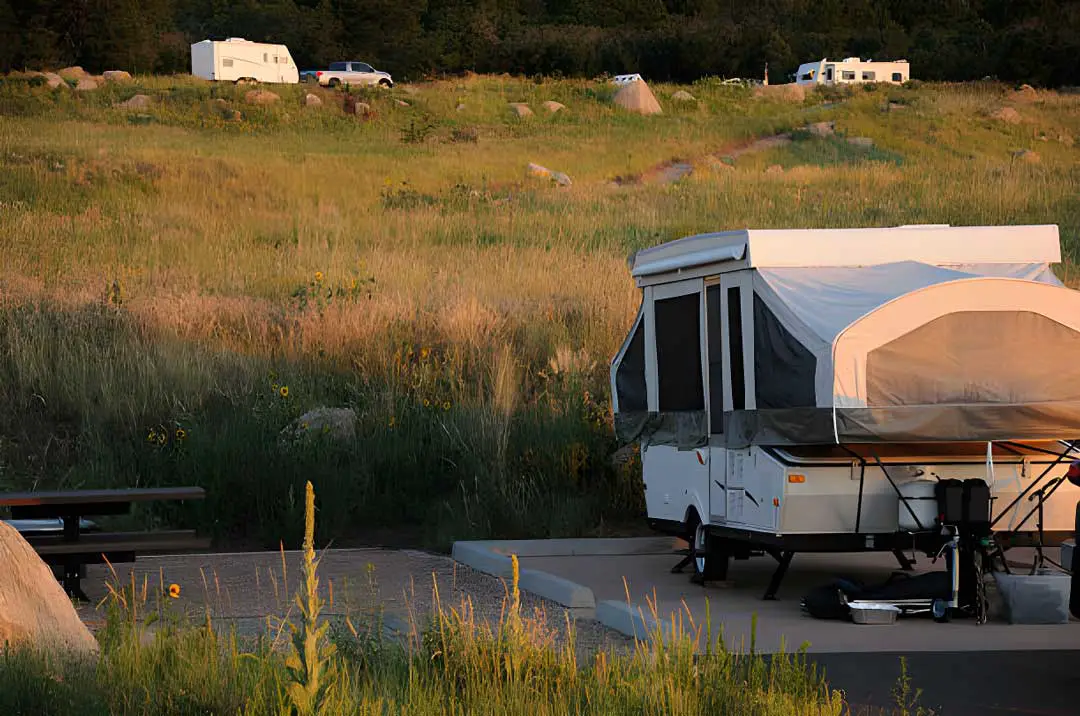
Proper Set-Up
When setting up your pop-up camper, ensure that the camper is on level ground. Use a spirit level to check for uneven ground. Position the tires correctly and use wheel chocks for additional stability. Always extend slide-outs slowly and carefully to maintain balance.
Secure Parking and Camping Spot
Choose a stable and level location for your camper to minimize the risk of tipping. Avoid parking on a slope or uneven ground, as this can increase the chances of your camper tipping over. Additionally, consider the safety and security of your parking spot, especially regarding weather conditions and potential hazards.
Weather Considerations
Keep an eye on local weather forecasts and be mindful of wind speed, as high winds and storms may cause your camper to sway and potentially tip over. Rain, snow, and hail can also increase the risk of tipping. When selecting a spot for your pop-up camper, find a location that offers shelter and protection from the elements as much as possible.
Stabilizing Equipment
To further reduce the risk of your camper tipping over, invest in stabilizing equipment. This may include stabilizer jacks, a tongue jack, and sway control devices. Properly securing the camper to the towing vehicle, adjusting tongue weight, and using stabilizing jacks can help prevent tipping. Regularly inspect and maintain your stabilizing equipment, as well as check the condition of your tires, to ensure they provide adequate stability.
- The RV jack set is adjustable from 16 inches to 30 inches.
- It has a load capacity of 6,000 pounds.
- The jack features a quick and easy pull pin for adjusting the height.
- It is made of durable steel and is powder coated for maximum rust protection.
Traveling Speed
When pulling your pop-up camper, adhere to speed limits and drive at safe speeds for the road and weather conditions. Driving too fast increases the risk of fishtailing, trailer sway, and tipping. Slower speeds also allow you more time to react to any potential hazards and maintain better control over your camper.
By following these safety precautions, you can minimize the chances of your pop-up camper tipping over, ensuring a more enjoyable and stress-free camping experience for you and your family.
Signs Your Pop-Up Camper Is About To Tip Over
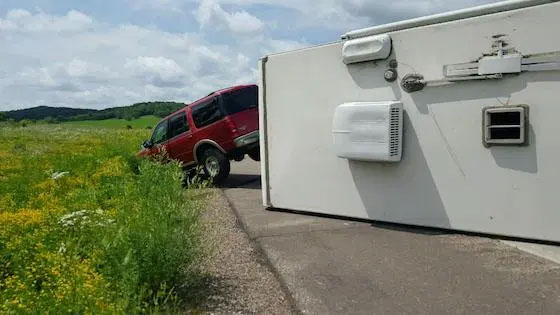
There are several telltale signs your camper is about to fall over. In many cases, it’ll be too late to act, so you’ll need to move quickly and focus on mitigating any damage from the fall.
The main signs your camper is about to tip are:
- Unusual sounds coming from the camper. Groaning, creaking, and cracking sounds are common as the camper begins to tip.
- Shaking or swaying from the camper. You’ll most likely be able to see or feel the camper start to waver back and forth as it struggles to right itself.
- Sounds coming from your vehicle or the hitch. The strain a tipping camper will put on your hauling vehicle will be clearly audible and visible. You’ll probably be able to feel your vehicle shaking or swaying, too.
If the camper is already in the process of falling over, be sure to evacuate if you’re inside it. If you’re still on the road and hauling the camper, try to pull over away from other drivers if possible.
Recovery and Repair if Tipped Over
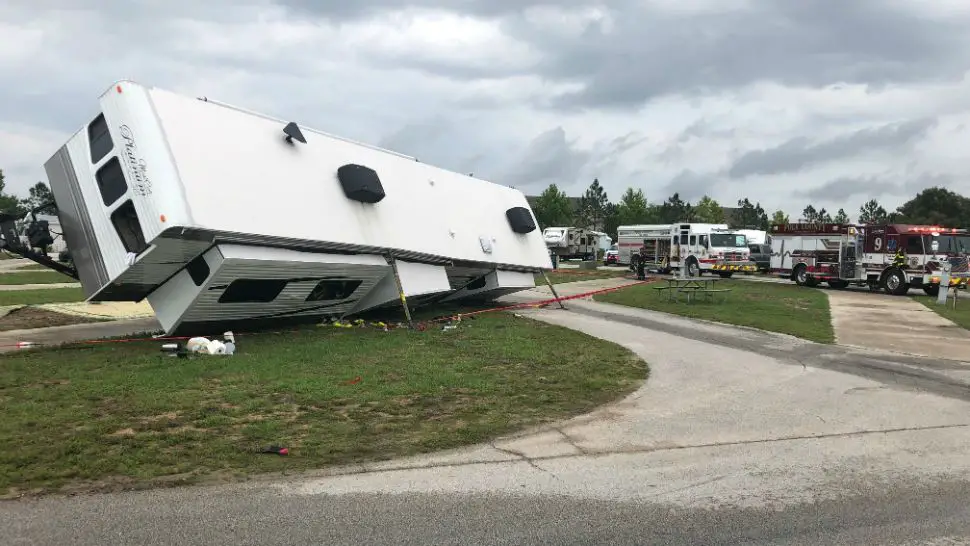
So your pop-up camper has tipped over. Whether you’re on the road or at the campsite, you’ll need to take a few necessary measures for your safety and to preserve the condition of your camper (or potentially repair it later).
If you’re inside the camper, exit it immediately once you’ve assessed any physical injuries and ensured the camper is now stationary. Get any other passengers, children, and pets out to safety.
Assessing Damage
If your pop-up camper has tipped over, the first thing you should do is assess the damage. Carefully examine the canvas, walls, zippers, and storage space for any signs of wear or damage. High-wall campers may have more structural damage due to their size. Inspect the steel frame for any bending or pressure points and check for any potential electrical fires. Be sure to also pay attention to the conditions that led to the tip over, such as bad weather, a hillside location, or acceleration issues.
Safety Measures
Prioritize safety when dealing with a tipped-over camper. Keep your family at a safe distance from the camper and avoid walking under or around it until the damage has been assessed. Use wheel chocks to prevent further rolling if the camper is on an incline. If the camper tipped over due to a storm or high winds, seek shelter elsewhere until the weather subsides.
Contains 312 pieces of essential first aid supplies for use at home, in the office, or on the go.
Make sure to:
- Keep a first aid kit handy for any injuries that could occur during the recovery process.
- Be cautious of any insects, bugs, or other wildlife that may have taken refuge in the camper after it tipped.
- Avoid touching any exposed electrical components.
- Keep a fire extinguisher nearby in case of potential electrical fires.
Seeking Assistance
If recovering the camper on your own proves to be too difficult, or there are injuries requiring medical attention, don’t hesitate to call for assistance. Professional towing services and emergency responders can help safely get your camper back on its wheels, as well as provide medical aid if needed. In some situations, a large vehicle like an RV or a truck can also be used to pull the camper upright, but this should only be attempted with proper equipment and knowledge.
Insurance Considerations
Reach out to your insurance provider to report the incident and discuss coverage options for repairs. Be prepared to provide details about the accident, such as the location, weather conditions, and how the camper tipped over. Insurance companies may cover damages to the camper, personal belongings inside, or even medical bills if applicable. Keep in mind that RV tip-over accidents may affect your insurance premiums, and be sure to follow any safety tips and adhere to RV speed limits in the future to prevent further accidents.
Frequently Asked Questions
How stable are pop-up campers?
Pop-up campers are generally stable, but they can tip over if not properly secured or set up on uneven ground. It is essential to secure your camper to your vehicle, adjust the tongue weight, and use stabilizing jacks. Always inspect the ground and ensure it is level before setting up your camper.
What causes a camper to tip?
A pop-up camper can tip due to several factors, including improper weight distribution, not being secured to the vehicle, or being set up on uneven ground. It’s crucial to follow the manufacturer’s guidelines to ensure the camper’s weight is distributed correctly and take the necessary precautions when setting up.
Do high winds affect pop-up campers?
High winds can impact pop-up campers, especially those with large surface areas. In extreme cases, strong gusts can cause the camper to tip over. It’s best to avoid setting up in areas with high wind exposure and always monitor the weather forecast before your trip.
How to prevent camper tipping?
To prevent your pop-up camper from tipping, ensure it is properly secured to your vehicle, and adjust the tongue weight if necessary. Use stabilizing jacks to keep the camper level, and inspect the ground before setting up. Avoid camping in areas with high wind exposure and always stay informed about weather conditions.
Are there weight limits for campers?
Yes, there are weight limits for campers. The manufacturer will provide information on the maximum weight capacity for your specific model. Ensure that you don’t overload your camper, as it could lead to tipping or other safety issues. Distribute your belongings evenly within the camper to maintain proper weight balance.
How to choose a sturdy pop-up camper?
When selecting a sturdy pop-up camper, consider factors such as its weight, stability features, and construction materials. Opt for a camper with a strong frame and durable fabric materials. Check the manufacturer’s guidelines for weight limits and stability features, such as stabilizing jacks. Additionally, read reviews and ask for recommendations from experienced campers to help you make an informed decision.


